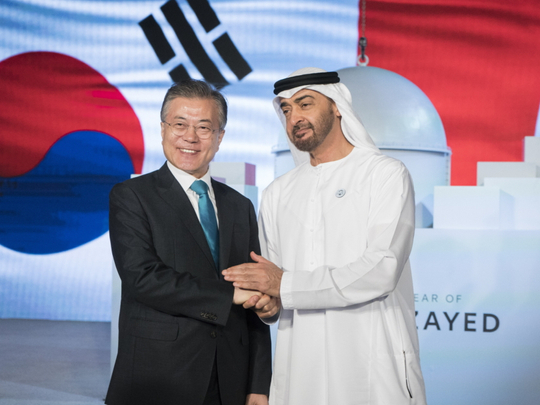
When South Korean President Moon Jae-in visited the UAE in March, his admiration for the country was palpable. “More than anything else, it is truly meaningful for me to visit the land that achieved the Miracle in the Desert through unceasing endeavours for reform and innovation as well as socio-economic progress,” he told WAM. The phrasing was no accident – Moon was drawing a direct parallel between the UAE’s journey and the Miracle on the Han River, the period of startling economic growth after the 1950-53 Korean War that saw South Korea ascend from developing to developed country.
After Moon met His Highness Shaikh Mohammad Bin Zayed Al Nahyan, Crown Prince of Abu Dhabi and Deputy Supreme Commander of the UAE Armed Forces, the two countries signed an agreement to establish a Special Strategic Partnership.
“The two leaders’ visit to the historic completion ceremony of the first unit of the Barakah Nuclear Power Plant showed us the strength of our friendship we have forged together,” Park Kang-ho, Ambassador of South Korea to the UAE, tells GN Focus. “When the construction of the four Barakah nuclear power reactors is completed, they will generate one fourth of the total electricity in the UAE.”
Park adds that the UAE is the largest importer of South Korean goods in the Middle East and Africa, and that half of all his compatriots living in the Middle East reside in the UAE.
Following Moon’s March visit, agriculture has merged into one of the major cooperative areas between the two countries. “Bilateral cooperation in the agricultural area is expected to contribute not only to the food security in the UAE but also to the preparation for climate change in the Republic of Korea,” explains Park.
Trade partnership
According to data provided by the South Korean Embassy, the UAE is currently the country’s 16th-largest trade partner, with trade totalling $15 billion (Dh55 billion) – an increase of 16.5 per cent over 2016.

“As South Korea has a strong position in manufacturing, the main export items to the UAE are plant structures, cars, petrochemicals, electronic devices, machinery and cigarettes,” explains Park (right). “The main import items from the UAE include crude oil, aluminium and copper products.” He adds that trade between the two has seen a slight dip in the year to August 2018 due to a slowdown in the car and cigarette markets.
Kwan Seok Lee, Regional President of Kotra – the national trade and investment promotion agency of South Korea – and General Manager of the Korea Trade Centre in Dubai, says, “I think that high-quality products brought to the market by Samsung, Hyundai and LG have engraved the Korea brand in the minds of people here. Consumer goods impact the lives of people on a daily basis.
“The UAE will be a very crucial market for Korean companies over the next few years as Expo 2020 Dubai is just around the corner. We all understand that the expo is expected to be a monumental event for the UAE and will be the catalyst that will bring new light to the economy in the GCC.”
Park says that though South Korea has made good presence in the UAE market in mobile phones, electronics and cars, the major Korean industries in the UAE are construction and engineering. “Many world-class Korean companies are doing business in the field of engineering procurement construction for infrastructure and plants. As is well known, the Barakah nuclear power project has been successfully progressed by a Korean team of KEPCO, Hyundai and Samsung C&T.”
People power
While he says there are no official statistics on this figure, Park estimates about 200,000 South Korean tourists visit the UAE on an annual basis. “With the visit of President Moon Jae-in to the UAE this year, exchanges and cooperation between the two countries have been more active than before in various fields including politics, economy, healthcare and culture.
“Accordingly, more Koreans have better understanding of the UAE, and interest in the UAE as a tourist destination has been growing among Koreans, so I expect the number of Korean tourists visiting the UAE will keep increasing.
“On a government level, we are also preparing a MoU on the development of bilateral cooperation in the field of tourism with the UAE government.”
As for expat residents, Park says there are 6,500 Koreans living in Abu Dhabi, and 13,000 in the UAE as a whole, with about 170 major South Korean companies operating here. “Most [Korean expats] are professionals in industries such as nuclear power, oil, gas and construction.” He adds that many South Koreans are impressed by the UAE leadership’s commitment towards investment in science, technology and education, as their own country has reaped the benefits of making similar moves in the past.
Lee says that as economies become increasingly advanced and businesses embrace cutting-edge technology, there will be fewer employment opportunities for young people at multinationals. He adds that the South Korean government is supporting start-ups as the answer, because they will create new products and services in new spaces. “Kotra plans on supporting start-ups in many facets such as finding investors, trading partners and other start-ups to create joint ventures with. During the Annual Investment Meeting 2018 held in Dubai, Kotra (Invest Korea) and Dubai FDI expanded on the previously signed MoU to include a collaborative support system for start-ups.”




